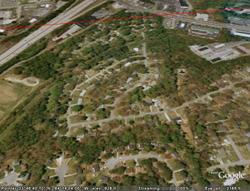The persistent cheerleading of the so-called financial "press" is going to break some people.
The Washington Post is today’s worst offender, bemoaning the disappearance of "no money down" mortgage loans and profiling a couple who were "lucky" to get one.
What’s worse is that the same story which describes this couple as "lucky" is also describing just why they’re not. Mortgage loans are drying up. This means there are fewer-and-fewer buyers for the larger-and-larger supply of houses on the market. So the house the "lucky" couple just bought is now worth less than they paid, and will be worth even less next week.
This is one reason why lenders require down payments, as protection against falling prices. If a loan defaults you can get your 80% of the original value out. If a "no money down" mortgage defaults there’s no way.
Yet the cheerleading goes on. The AP is breathlessly reporting "mortgage rates are down!" They’re down 1 basis point, .01%. That’s nothing. Yet the AP is breathlessly claiming a breakthrough. The AP! That used to be the gold standard for honest reporting. No more.
And another thing. When newspapers like The New York Times write sorrowful profiles of people victimized by new mortgage scams, do they always have to use overweight, middle aged black women?
Or if they do, might they then ask why? Because it’s true that in my
neighborhood a substantial portion of the foreclosed property on the
market seems to be small, cheap stuff which doesn’t turn over often. How did people get
into big trouble buying these tiny, old, unrenovated houses? Anyone
asking?
The plain fact is that the housing bust has a long way to go. Increased
foreclosures mean more supply, and tighter lending requirements mean
less demand. It’s a very simple equation.
It’s also going to get worse,
as Realtors find they can’t unload those "investment" properties they
bought with interest-only "balloon" notes over the next few years.
(This may be one reason why the industry is absolutely insisting on
happy talk — they’re sweating worse than anyone.)
Before this is over, the price of homes in many neighborhoods will fall below
replacement costs. The range of "good" neighborhoods will contract,
toward those which are within a few miles of major employment centers
with some stability. Neighborhoods which right now look fine are going
to get busted, as scavengers throw renters into nearby properties and
those properties become run-down. The pain will increase as people get
laid-off throughout the real estate industry, as has just started.
We are far more heavily leveraged to the real estate industry than
during the last slump, in the 1970s. Back then 100% loans and
interest-only loans were unheard of, except for investors who had ample
cash to cover the notes. Back then prices started much, much lower, so
the dollars lost in the fall were much, much less. Back then building
stopped before the bust really got underway — right now there are
still several hundred units under construction within a few miles of my
home.
Happy talk is not going to change the reality. Happy talk is just going
to get more people in trouble. Housing prices right now are a falling
knife, and you don’t get in the way of a falling knife. You scuttle out
of the way, wait until it falls, then pick through the rubble
carefully, and bargain hard.
Anyone who buys a home in this market is a sucker.













